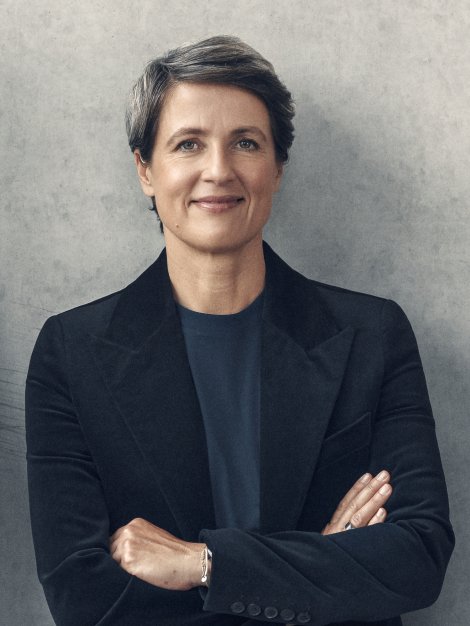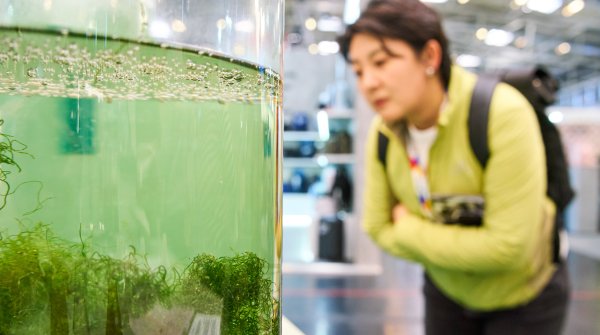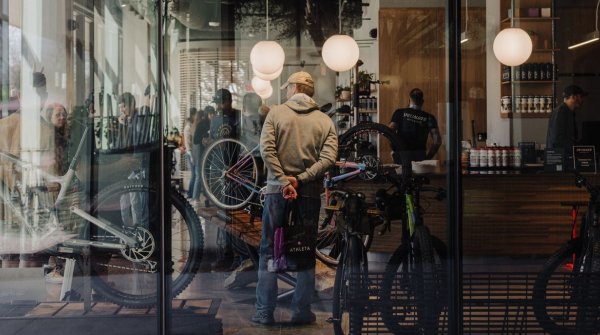- I wish I had ridden my bike!
- Bike lifestyle needs reliability
- When the bike talks to the traffic light
- Recycled aluminum for greener biking
- Aspiration and reality of the traffic turnaround diverge
- Subsidy for cargo bike?
- Other countries show the way
- Radical upheaval, even if it hurts
- Engineering like in the automotive industry
- Biking is the Riese &Müller DNA
- The right bike for everyone
The climate-induced shift in traffic is giving bicycles a tailwind. This was demonstrated by the presence of the bicycle industry at this year's IAA Mobility in Munich. Strategy expert Sandra Wolf underscored Riese & Müller's position as a premium German brand for e-bikes and cargo bikes to drive solutions for sustainable mobility in the international market. "For us, the agenda is to replace the car," Wolf said in a Spiegel interview ahead of the auto and mobility trade show - a provocative thesis. In her statements for our "Challenges of a CEO" format, the enthusiastic biker takes a stand on the mobility of the future.
Riese & Müller
With its forward-looking products and as a specialist for cargo bikes and fast HS bikes, Riese & Müller is shaping the mobility of tomorrow and stands for a sustainable lifestyle, application-oriented product development and innovative e-bike technologies. Founded in 1993, the owner-managed company achieved sales of 350 million euros in 2022. The energy requirements of the company campus in Mühltal near Darmstadt are completely CO2-neutral. With digital and partially automated processes, the plant is one of the most modern production facilities for e-bikes in the world.
Innovation is in the genes of Riese & Müller. We continue to work on the idea that has always driven our founders: How can we improve cycling in such a way that people enjoy doing without their cars? It was and is our aspiration that for every car trip you take after all, you'll think, "I wish I'd taken a bike!" But despite the e-bike boom, there is still a lot of room for improvement. Compared to the car - especially in terms of the distances travelled - a lot still has to happen for the two-wheeler to replace the car over short and medium distances.
In cities like Paris, a new lifestyle is inspiring a shift in transportation. With this bike lifestyle, people are consciously overcoming the car. In everyday life, the bicycle functions as a substitute for the second car or the car in general. This places new demands on the vehicle. Our strategy positions Riese & Müller as a premium product, as a technology driver. Each of our bikes is precisely thought out, sensible and durable, it fulfils its purpose in everyday life comfortably and safely. We will not deviate from this quality standard. On the contrary. We want our riders to use their bikes not only for short trips, but of course for all journeys up to 20 or 30 kilometres and far beyond. And that in all weathers and on all routes.
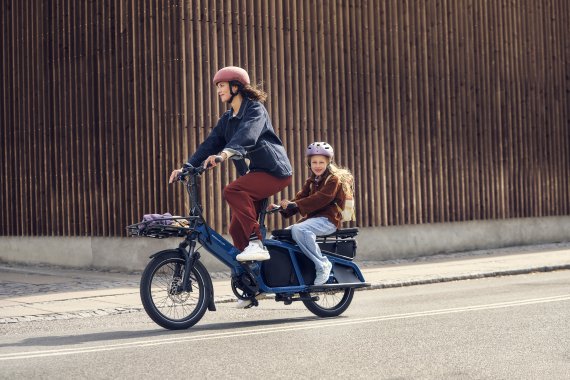
With their shared passion for cycling and tinkering, Markus Riese and Heiko Müller have decisively advanced the development of the full-suspension bicycle and the e-drive. We come from Germany and define ourselves in the international markets primarily as a high-class technology product. Innovation at our company is constantly ongoing. Benefits are important to us: we seek out technological innovations not for the sake of gadgets, but because they make cycling safer and more enjoyable. Digitalization is a huge driver of innovation. In terms of connectivity, we want our vehicles to communicate with cars and traffic lights. Turning accidents or "dooring", i.e. when inattentive drivers simply open the door, are the worst dangers in the city. Digital collaboration between the various road users could prevent accidents. Unfortunately, we're not there yet, but we're working on it, because we're much more vulnerable on a bike than in a car or on a street car.
I always associate cycling with a focus on climate protection. As a company, we also have to be consistently sustainable. With our production figures of almost 115,000 vehicles per year, we are a major manufacturer that plays an important role among suppliers because we are innovative and actually also develop together. A bicycle consists of 100 to 120 components, so we analyse possible improvements bit by bit with our suppliers in the spirit of the circular economy. Through nearshoring, we benefit from the growing European supplier market, which is developing in Bike Valley around Porto or in Spain, for example. We actually have greater influence here than in Asia. For our new Culture model, we are having the frame, the most material-intensive individual part, made to a large extent from recycled aluminium with significantly better CO2-balance. This is only possible in Europe. For the batteries, we have joined the European recycling system. We need our customers to be aware of this and actually make use of it. And in the case of our accessories, too, we have put the issue of recycling and the carbon footprint at the top of the agenda for all materials in the entire development area right from the start.
In my view, the transport revolution has so far failed because no fundamental overall goal has been formulated. In this respect, I call on policymakers and the manufacturers and suppliers of the various forms of mobility to act more quickly and come up with coordinated solutions. If we want to improve traffic and the quality of life in cities, we have to make it safe and convenient for people who want to ride their bikes. This means that we need a bicycle infrastructure that is reasonably developed and, above all, continuous.
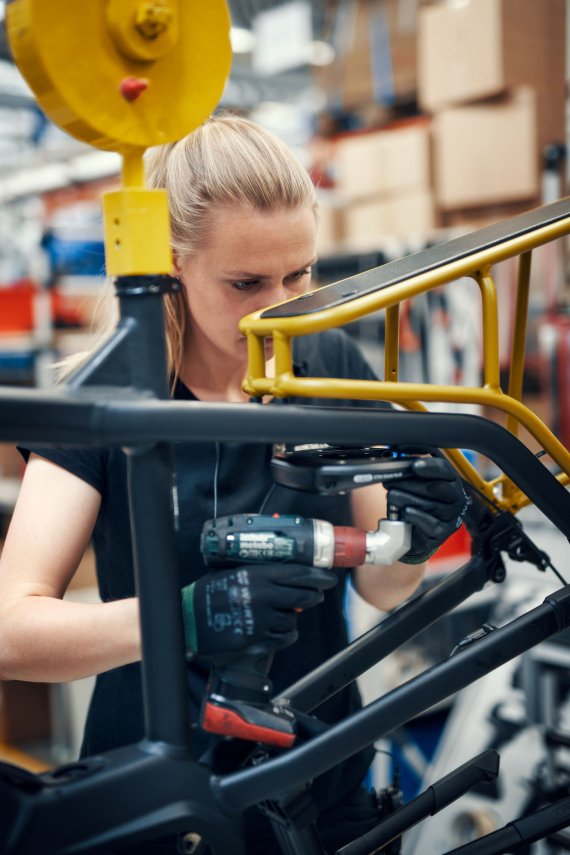
The coalition agreement of the German government was a good signal. Now the budget for bicycle mobility is being slashed. The urgently needed expansion of the infrastructure is suffering as a result. Government subsidies are providing impetus for the switch to e-cars. The 49-euro ticket supports public transportation. But for cargo bikes, for example, there is a patchwork of subsidies. There should be uniform support for young families or companies that want to switch to electric vehicles.
When we talk about bike-friendly urban centres, Amsterdam and Copenhagen are the all-time favourites. They even have heated bike lanes that are easy to ride on even when it's freezing in the winter. That's state of the art. But I'm now seeing a change in thinking in many other major cities as well. Interestingly, we're seeing this in countries where we tend to think there's more of an affinity for cars. Paris and Barcelona are doing a great job of it. In the U.S., the major metropolitan areas on the West Coast are showing it, as well as Washington or New York with beautiful bike paths along the Hudson River. I was in Portland last year on business and only biked - and maybe just 50 meters without a perfect bike lane. In Germany, I find Hamburg exemplary with its progress, and Frankfurt is also developing - unlike Berlin. When pop-up bike lanes are cut back, it's a shame.
Clearly, changes in cities are creating a distribution battle for limited street space. This upheaval also hurts. But it's about improving people's quality of life. So we as a society have to make decisions about how to redistribute space for pedestrians, cyclists and cars. And that may have to be radical at times. Paris shows how such a transformation can take place. They do it prototypically. There, decisions are made very consistently. Car lanes are now used for micromobility. Now urban society is beginning to discuss the issue. It will develop from this unrest and ultimately lead to a good restructuring. For me, Paris is a real role model for this process.
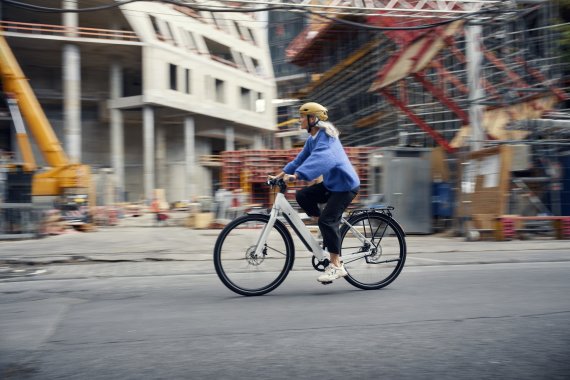
We are not running out of development topics in the bicycle industry. I see the jobs for young engineers as being on a par with those in the automotive industry. We are working on the digitalization of tomorrow's mobility, on frames, drives and chassis - of course, all on a somewhat smaller scale. To be able to drive at high speeds and on bad roads, for example, you need a perfectly tuned suspension. For maximum safety when braking, ABS and brake lights are a hot topic. On longer routes in the dark, low and high beams are convenient. In winter, the heated saddle is practical. Safety and weather protection for children in cargo bikes are also a big topic.
I am always thrilled when I sense the passion with which our 900 employees from 58 nations live the subject of bicycles. This is anchored in our corporate culture. Many of them come to work every day on their job bikes as a matter of course. Our guests are always amazed when they see our car park, where hundreds of bikes are parked. For me and my family, too, it's hard to imagine everyday life without a bicycle. I drive extremely little, mainly when I have to travel in a rural region where it's too far for a bike and not practical with public transport. I just like to bike. So I'm happy that I can test ride new products or components more often and give our developers feedback. But my favourite product is and remains my full-suspension cargo bike. People often ask me: Why are you still riding a cargo bike when your children are already grown up? But with a car, no one asks why it has a boot. The cargo bike is totally practical, I always have something to transport. At the same time, I can ride it really fast and at the same time I feel incredibly safe. It doesn't get any better than that!
Alongside Heiko Müller, Dr. Sandra Wolf is managing partner of Riese & Müller. After working as a strategy consultant for international clients at renowned branding and design agencies, she ran her own brand agency in Berlin. Since 2013, Dr. Wolf, who holds a doctorate in economics, has been responsible for strategic alignment, HR, brand perception, sustainability, and mobility of the future at Riese & Müller.
Just as SUVs are very popular in cars, our wheels with thicker tires and sturdy frames are also very well received in the market. They exude safety, comfort and suitability for all routes. However, while an SUV car takes up almost twice the traffic space of a small car, the SUV bike remains compact and suitable for city use. We also differentiate for different target groups. One important trend is slim, lightweight bikes for the young, sporty and urban lifestyle - where you can hardly tell it's an e-bike. And among cargo bikes, long tails have become popular as an alternative to the relatively large long johns with the loading area in front of the riders. They are hardly bigger than a normal bike. On the somewhat longer, stable rear end, however, I can transport up to two children or some loads safely and comfortably.
- ISPO awards
- Mountain sports
- Bike
- Design
- Retail
- Fitness
- Health
- ISPO Job Market
- ISPO Munich
- ISPO Shanghai
- Running
- Brands
- Sustainability
- Olympia
- OutDoor
- Promotion
- Sports Business
- ISPO Textrends
- Triathlon
- Water sports
- Winter sports
- eSports
- SportsTech
- OutDoor by ISPO
- Heroes
- Transformation
- Sport Fashion
- Urban Culture
- Challenges of a CEO
- Trade fairs
- Sports
- Find the Balance
- Product reviews
- Newsletter Exclusive Area
- Magazine
